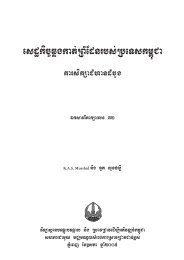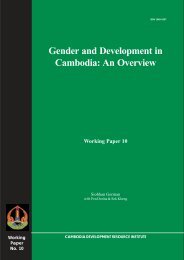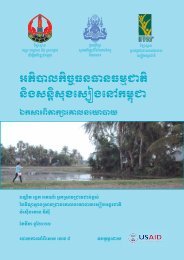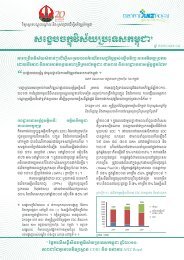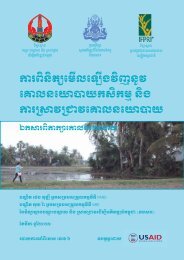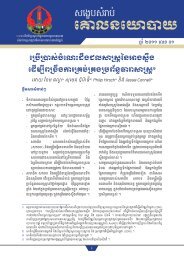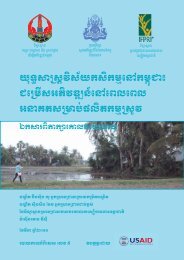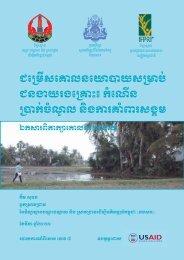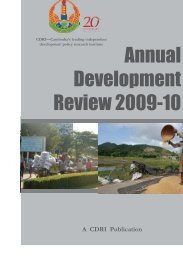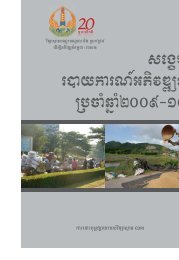62) decentralised governance of irrigation water in cambodia - CDRI
62) decentralised governance of irrigation water in cambodia - CDRI
62) decentralised governance of irrigation water in cambodia - CDRI
Create successful ePaper yourself
Turn your PDF publications into a flip-book with our unique Google optimized e-Paper software.
case when large-scale <strong>irrigation</strong> schemes are constructed without proper recognition <strong>of</strong> preexist<strong>in</strong>g<br />
small-scale community livelihoods.<br />
In recent years, the prevail<strong>in</strong>g “developmentalist” ideology has been strongly challenged<br />
by <strong>in</strong>ternational commissions and grassroots voices alike (for example, WCD 2000; Liv<strong>in</strong>g<br />
River Siam 2010). Traditional concepts <strong>of</strong> eng<strong>in</strong>eered <strong>water</strong> control and expert-driven <strong>water</strong><br />
management are start<strong>in</strong>g to give way to the more holistic and socially-embedded idea <strong>of</strong> “<strong>water</strong><br />
<strong>governance</strong>” (Moll<strong>in</strong>ga 2008). In general terms, <strong>water</strong> <strong>governance</strong> refers to:<br />
….the range <strong>of</strong> political, social, economic and adm<strong>in</strong>istrative systems that are <strong>in</strong> place<br />
to regulate the development and management <strong>of</strong> <strong>water</strong> resources and provision <strong>of</strong> <strong>water</strong><br />
services at different levels <strong>of</strong> society (GWP 2002).<br />
More specifically, the concept <strong>of</strong> “<strong>irrigation</strong> <strong>governance</strong>” recognises that physical<br />
<strong>irrigation</strong> technologies need to be accompanied by appropriately-scaled social and economic<br />
<strong>in</strong>stitutions (Coward 1980; Ostrom 1999). Through formal and <strong>in</strong>formal means, this <strong>in</strong>tegrated<br />
approach seeks to achieve more efficient, equitable and susta<strong>in</strong>able <strong>irrigation</strong> outcomes. As<br />
stated by El<strong>in</strong>or Ostrom, recipient <strong>of</strong> the 2009 Nobel Prize for Economics:<br />
For the next several decades, the most important question related to <strong>water</strong><br />
resource development is that <strong>of</strong> <strong>in</strong>stitutional design rather than eng<strong>in</strong>eer<strong>in</strong>g design<br />
(Ostrom 1999: 74).<br />
2.2 Deconstruct<strong>in</strong>g “Participation”<br />
Benefits and challenges <strong>of</strong> community <strong>in</strong>volvement <strong>in</strong> <strong>irrigation</strong> <strong>governance</strong><br />
Ideally, <strong>irrigation</strong> <strong>governance</strong> should <strong>in</strong>volve a diverse range <strong>of</strong> stakeholders at different<br />
levels <strong>of</strong> society. With<strong>in</strong> this broad pr<strong>in</strong>ciple, a number <strong>of</strong> specific ideas can be identified.<br />
Draw<strong>in</strong>g on Arnste<strong>in</strong>’s (1969) “ladder <strong>of</strong> citizen participation”, Ribot (2000) argues that<br />
effective decision-mak<strong>in</strong>g requires genu<strong>in</strong>e power-shar<strong>in</strong>g, not just tokenistic “fly <strong>in</strong>, fly out”<br />
consultation. Accord<strong>in</strong>g to Ostrom (1992), <strong>irrigation</strong> planners should give particular weight to<br />
the views <strong>of</strong> the most directly affected “recipient communities”. Calaguas and Francis (2004)<br />
focus on the temporal dimension, emphasis<strong>in</strong>g that community <strong>in</strong>put is important at all stages<br />
<strong>of</strong> the design, construction and ma<strong>in</strong>tenance <strong>of</strong> an <strong>irrigation</strong> system. In the ever-expand<strong>in</strong>g<br />
body <strong>of</strong> susta<strong>in</strong>able development literature, this collection <strong>of</strong> norms is <strong>of</strong>ten referred to as the<br />
“participatory approach”.<br />
The idea <strong>of</strong> community participation has long been implicit <strong>in</strong> certa<strong>in</strong> sectors <strong>of</strong> the<br />
<strong>water</strong> management literature (see, for example, Curran 1971; Coward 1976). Nevertheless,<br />
it is only <strong>in</strong> the last 20 years that a fully-fledged “participatory approach” has reached the<br />
development ma<strong>in</strong>stream, propelled <strong>in</strong>to the limelight by a series <strong>of</strong> <strong>in</strong>ternational conventions<br />
and agreements. In preparation for the 1992 Rio “Earth Summit”, the Dubl<strong>in</strong> Statement on<br />
Water and Susta<strong>in</strong>able Development (“the Dubl<strong>in</strong> Pr<strong>in</strong>ciples”) stated that “<strong>water</strong> development<br />
and management should be based on a participatory approach, <strong>in</strong>volv<strong>in</strong>g users, planners and<br />
policy-makers at all levels” (ICWE 1992: Pr<strong>in</strong>ciple 2). At the Rio Summit itself, Agenda 21<br />
emphasised the need for “full public participation, <strong>in</strong>clud<strong>in</strong>g that <strong>of</strong> women, youth, <strong>in</strong>digenous<br />
people and local communities” (UNCED 1992: Article 9, Chapter 18). More fundamentally,<br />
Agenda 21 l<strong>in</strong>ked “participation” to wider agendas <strong>of</strong> “decentralisation” by call<strong>in</strong>g for <strong>water</strong><br />
to be managed “at the lowest appropriate level” (UNCED 1992: Article 12 (o) (i), Chapter<br />
4 Decentralised Governance <strong>of</strong> Irrigation Water <strong>in</strong> Cambodia: Match<strong>in</strong>g Pr<strong>in</strong>ciples to Local Realities



